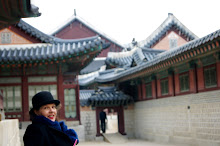Article about Wang Yongchao
in China Daily.
What happened was that "sewerage-drains billionaire" Wang was so upset by the city of Guangzhou tearing down so many Ming and Qing dynasty courtyard houses to make way for urban development that he bought 40 of them, had them dismantled and reassembled in the countryside using "temple-quality craftsmen" (Adore that description. China uses it a lot.).
It cost him so much over the years that he had to one-by-one sell all seven of his companies and today the poor fellow is now broke ... but with a new village of Ming and Qing dynasty courtyard houses outside Xi'an in the rural district of Shaanxi as the only thing still to his name.
But what to do with it? He can no longer afford to run the place. Is it now to simply be a white elephant? A sad folly?
Horse-hitching posts and Wang himself.
He also over the years rescued 33,600 "junk" objects from the Guangdong area that were being sawn up and/or thrown away and which always turned out to be interesting folk objects from thousands of years ago. And he particularly fell in love with the strange posts that were being cut up to sell as statues so he rescued 8,600 of them. And, after much study by archeologists and historians, they turned out to be horse-hitching posts from as far back as the Tang dynasty (AD 618 - 907) up to the Yuan Dynasty (AD1217-1368); relics of a collection of Guangdong horse-stud farms that, for several thousand years, bred war horses for Northern AND Southern China. And it turns out that such hitching-posts are endemic to Guangdong and found nowhere else in China. And how great is it that these horse-hitching posts are carved with records of actual historical events that could rewrite the history of China's wars.
So great kudos to Wang for saving them. And for saving the houses. And for saving everything else too. It's just a pity that things have ended up the way they have.
So great kudos to Wang for saving them. And for saving the houses. And for saving everything else too. It's just a pity that things have ended up the way they have.
So that's how things stand at the moment: Wang is broke and wondering if he can put his new old township to any use. Yes, he's thought of making it over into a Folk Museum ... but he certainly hasn't thought of turning part of his town into Boutique Hotels. I know I'm longing to spend at least a fortnight exploring his world and I'd dearly love to stay in a Ming Dynasty courtyard house while doing so.
I'm also thinking about Prince Charles and how he once put together a township in England called Poundbury based on Medieval principles of urban/rural use. It was such a silly and romantic thing to do that I'm sure Wang would probably be the only other person on the planet to totally get it. Let me see if I can find anything on how Prince Charles once ended up with a town on his hands and no idea what to do next.
Yup, here it is: Poundbury.
You know, I think if any two people should get together to talk it's Prince Charles and Wang Yongchao because they'd totally get each other. And since Prince Charles has previously been down this path himself he would probably really be helpful with the advice.
But anyway, if you have any ideas for what my new hero Wang should do with his new old town, he can undoubtedly be reached though the writer of the Daily Post article Lu Hongyan, who can be reached at zhangzixuan@chinadaily.com.cn
 :
:






1 comment:
"I know I'm frequently mean about Mainland China...."
Not mean. Just accurate.
And despite this gentleman's altogether laudable efforts, I find their overall hasty indifference to their cultural artifacts in the name of profit and "progress" more than a little disturbing.
Only a peasant values a thing for its monetary value or immediate utility, rather than for what it truly is.* And I expect you'll agree with me that seems to be a big failing with the majority of Mainland Chinese.
Just a thought.
VicB3
*Something I have to constantly point out to my Indians, who always ask immediately what something cost and then wonder how much it can be sold for.
Post a Comment